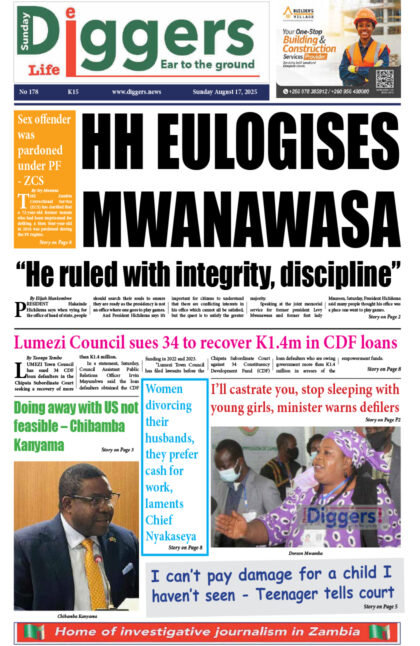Government missed its target of K10.6 billion in income tax collection for the 2018 half-year period by around K500 million, owing to lower than projected collections, says ZIPAR.
According to a ZIPAR policy brief released last week, income tax collections were reduced to K10.1 billion for the half-year period ending June 30, 2018, from government’s targeted amount of K10.6 billion.
The policy brief, produced by ZIPAR research fellows Shebo Nalishebo and Florence Banda-Muleya, revealed that the income tax underperformance was largely on account of lower than projected collections for both mining and non-mining company income tax, among others.
“Against a target of K10.6 billion, income tax collections amounted to K10.1 billion. This was due to lower than projected collections for both mining and non-mining company income tax, Pay As You Earn, and withholding tax,” ZIPAR stated.
The policy think tank explained that the lower income tax earned pointed towards sluggish economic growth.
“Lower-than-projected performance of income taxes in the period is reminiscent of poor performance in 2017 and points to the sluggish economic growth experienced since 2015, and a multiplicity of tax rates and incentives,” it stated.
“Sluggish economic growth continues to prevail at present. GDP (Gross Domestic Product) growth was recorded at 2.6 per cent in Q1 2018, the lowest growth since Q4 2015, and a far-cry from the strong growth experienced before 2015. The low growth has resulted in declining taxable income. By not paying attention to, and sufficiently promoting private sector performance, the government is now missing out on taxable income.”
ZIPAR also stated that customs and excise duties also underperformed during the six-month period under review by almost K700 million.
“Customs and excise duties underperformed – against a target of K3.7 billion for the first six months of 2018, only K3.0 billion was collected. Particularly, excise duties had a relatively poor performance – against a target of K2.1 billion, collections from excise were K1.4 billion. This translates to an under-collection of K667 million during the first half of the year,” ZIPAR revealed.
“Considering that imports have been on the rise in the first half of the year, this seems to suggest a challenge on the domestic side of excise duties. Some measures introduced in the 2017 and 2018 [national] budget (such as increasing excise duty on air time from 15 per cent to 17.5 per cent; the aligning of excise duty to 125 per cent on methylated spirits) may either be having a dampening effect of reducing consumption and, therefore, the taxes, or have not been fully implemented.”
However, on the other hand, ZIPAR noted that VAT performance continued to outshine other taxes as government exceeded their half-year period target.
“Against a target of K5.5 billion, VAT revenue amounted to K7.9 billion in the first six months of 2018. The measures introduced in 2017 and 2018, including withholding the tax at source by appointed agents, seems to be paying off,” ZIPAR narrated.
Meanwhile, the policy brief showed that government’s half-year expenditure soared above the set targets.
“During January to June, 2018, the government’s expenditure was K40 billion or 55 per cent of the 2018 budget of K71.7 billion. This is higher than the projected expenditure of K34 billion. Interest payments have been the main drivers of this over-spending (owing to high debt accumulation) as well as capital expenditure (due to increased disbursements for foreign-financed capital projects,” stated ZIPAR.
























